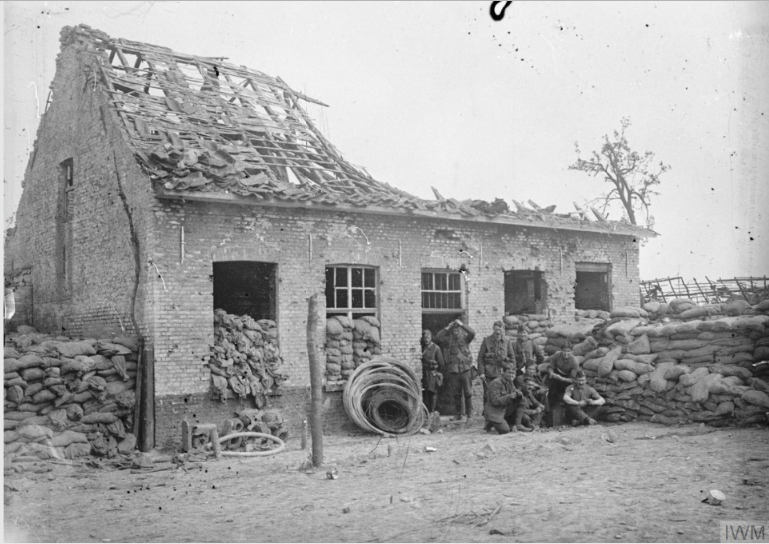The Western Front January–June 1915

Trenches at St Eloi
(© Imperial War Museum: Q 49817)
The Second Battle of Ypres (22 April–25 May 1915): 60,000 British casualties, 10,000 French casualties, 35,000 German casualties. Includes:
- the Battle of Neuve Chapelle (10–13 March 1915): 7,000 British casualties, 4,200 Indian casualties, c.11,200 German casualties;
- the First Battle of Hill 60 (17 April–7 May 1915);
- the Battle of Gravenstafel (22/23 April);
- the Battle of Sint Juliaan (24 April–4 May);
- the Battle of Frezenberg (8–15 May);
- the Action at Aubers Ridge/Fromelles (9 May 1915): 10,000 British casualties;
- the Battle of Festubert (15–25 May 1915): c.17,000 Allied casualties, 4,800 German casualties;
- the Battle of Bellewaerde (24/25 May): 15,000 British casualties.
“A Major and myself are the only Officers left of the lot who originally entered Belgium in August. Young Fletcher, the one who is a master at Eton, came out originally with me – but I have lost sight of him. The other day I saw Tommy Hutchinson [matriculated 1899], who, it appears, is a Captain in the Oxfordshire Yeomanry – but otherwise I have met no-one who was at Magdalen with me. Otherwise everyone one knows appears to be out here in some capacity or other and many friends are now dead.
This is a terrible war and, unless the unforeseen happens or we do not mean to carry it on to a satisfactory end, the war has only just begun. People in England might be tempted to think, when they read the papers, that the Germans are practically beaten and dispirited – but this is far from being the case. We want 2,000,000 men from England and must be prepared to lose 1,000,000 of these. – Military Service would have saved us all this. In the first place we should never have had this war at all – and if we had, we should have won in Belgium in August.”
(Letter from Joseph McKeand Addison (1879–1953; matriculated 1898) to President Warren of 10 January 1915. Like Walter George Fletcher (killed in action on 20 March 1915 while serving with the 2nd Battalion of the Royal Welch Fusiliers), Addison was serving in the Army as an interpreter. MCA: PR32/C/3/17, President Warren’s War-Time Correspondence)
“The British still hold Hill 60, an important point wh[ich] the Germans are trying to retake at the price of heavy loss of life on their part. […] The news today good: we hold Hill 60: the German reports do not look well for them. […] Fritillaries are beginning to show in the Meadow. The Germans have been using asphyxiating bombs, wh[ich] made the allies retire near the Yser canal.”
(C.C.J. Webb, Diary entry, 22–24 April 1915)
“Made very sad by the news of the death in action of three of the best of our young men: Kenneth Campbell, to whom I was much attached: Cable, whose genuine interest in his Greats work had made him, though not likely to do great things in it, the very centre of the common interest in it of the men of his year: & Harry Howard. Requiescant in pace. I wrote to the fathers of all three. [Webb then describes a long walk “in a beautiful part of Oxford”.] But we were thinking all the time of the fields of Flanders & our young friends fighting and falling there. God be merciful to us.”
(C.C.J Webb, Diary entry, 15 May 1915)
“The news from the western front good on [the] whole: but there must be horrendously heavy fighting going on […]. The Belgian atrocities report in paper. Appalling reading! – yet every sign of careful estimation of evidence.”
(C.C.J. Webb, Diary entry, 13 May 1915)
“Little war news: what there was was pretty good. No fresh Magdalen names in casualty lists.”
“The casualty lists contain the news of poor Geoffrey Daman’s death. He seems to have been distinguishing himself.”
(C.C.J. Webb, Diary entries, 21 and 29 May 1915)
“I was harassed as often of late by the thought that I ought to join ‘Godley’s army’ [the Oxford Volunteer Training Corps] & almost made up my mind to do so next week by presenting myself at an evening ‘recruits’ drill’.”
“[…] I went to a recruits’ drill of ‘Godley’s Army’ in the Corn Exchange. Walden drilled us – he is, as I have always heard, an astonishingly good instructor. Ballard was next [to] me in the ranks. Rashdall and Hayes (!) were also drilling. I did not sign on & cannot make up my mind about doing so. It was a very unattractive way of spending one’s time.”
“Wrote to Godley saying I had not signed on & did not wish to do so yet.”
“Arranged for a service in memory of Magdalen men who had fallen in the war.”
(C.C.J. Webb, Diary entries, 3, 7, 8 and 9 June 1915)
Graham Menzies, Alastair 1.i.1915
Perssé, Rodolph Algernon 1.i.1915
Pigot-Moodie, Charles Alfred 13.i.1915
Gibbs, Eustace Lyle 11.ii.1915
Nicholson, William Dukinfield 23.ii.1915
von Francken-Sierstorpff Graf Edwin Viktor Guido Friedrich Wilhelm Heinrich Kaspar Johannes Maria 18.iii.1915
Girdlestone, Morrell Andrew 25.iii.1915
Morrison, Gerard Humphrey 31.iii.1915
Huth, Austin Henry 19/20.iv.1915
Norton, Thomas Edgar Grantley 20.iv.1915
Birchall, Arthur Percival Dearman 23.iv.1915
Maclagan, Gilchrist Stanley 25.iv.1915
Martin, Charles Herbert George 1.v.1915
Robins, George Upton 7.v.1915
Molineux, George King 8.v.1915
Howard, Hon. Robert Henry Palmer 8.v.1915
Curwen, Wilfred John Hutton 9.v.1915
Cable, George Pickersgill 9.v.1915
Cadenhead, George 10.v.1915
Campbell, Kenneth James 10.v.1915
Cree, Arthur Thomas Crawford 12.v.1915
Johnston, John Leslie 12.v.1915
English, Robert Ernest 13.v.1915
Hobson, Alwyne Chadwyk 13.v.1915
Bonham-Carter, Guy 15.v.1915
Daman, Geoffrey Windeatt 24.v.1915
Moon, Basil Oliver 24.v.1915
Knight, Arthur George 29.vi.1915